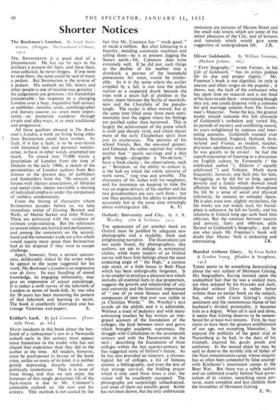Oliver Goldsmith. By William Freeman.
(Herbert Jenkins. 18s.)
"EVEN biography," wrote Forster, in his Life of Goldsmith, " has its critics jealous for its due and proper dignity." Mr. Freeman's book is not dignified, its style is uneven and often verges on the popular ; it shows, too, the fault of the enthusiast who has spent time on research and is too fond of his facts to edit them : entertaining though they are, one could dispense with a contents list and marriage column from The Gentle- man's Magazine. None the less, the general reader should welcome this full chronicle of Goldsmith's turbulent and varied life, its periods of mystery and conflicting record, its years enlightened by copious and inter- esting accounts. Goldsmith roamed over Ireland, Scotland, England, Holland, Swit- zerland and France, as student, teacher, physician, apothecary and flautist. At times he was greatly to be envied : he had the superb experience of listening to a discussion on English culture by Fontenelle (" the celebrated author "), Diderot (" equally celebrated ") and Voltaire. Much more frequently, however, one feels pity for him. Struggling, as he did for so long, against poverty and a family which showed small affection for him, handicapped throughout his life by a sense of social and physical inferiority, he remains an unhappy figure. He is also, even now, slightly mysterious, for Ms works are not widely read, his burial- place is unknown, he left no family, and his relations in Ireland long ago sank back into oblivion. But the contrast between success and poverty, fame and oblivion, adds flavour to Goldsmith's -biography • and no one who reads Mr. Freeman's book will doubt that Master • Noll is endearing and


































 Previous page
Previous page